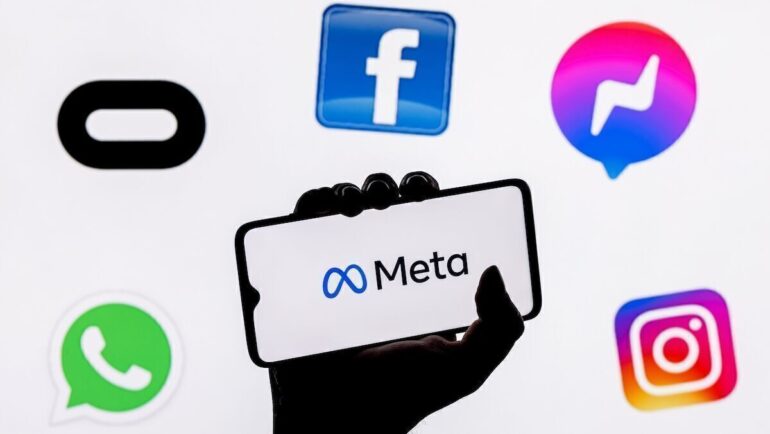TL;DR:
- AI is set to be introduced to WhatsApp, Messenger, and the Metaverse.
- Meta’s financial report emphasized the importance of “efficiency work” and AI’s impact on monetization.
- The influx of AI chatbots and generative AI models raises concerns about operational efficiency.
- Meta plans to integrate AI agents into its platforms, including WhatsApp and Messenger, and introduce visual creation tools for Facebook and Instagram.
- AI will have applications in advertising and business-focused user experiences.
- Meta aims to extend AI advancements to the metaverse, enabling the easy creation of avatars, objects, and immersive worlds.
- TikTok has also introduced AI-generated avatars for users.
- Meta’s CEO, Mark Zuckerberg, highlights an open ecosystem approach to deploying AI models.
- Speculation about Meta’s shift to AI is refuted, with Zuckerberg reaffirming the company’s dedication to both AI and the metaverse.
- Microsoft also invests in AI integration, envisioning chatbots as a new way for people to seek information through its products.
- Microsoft’s efforts aim to challenge Google Search’s dominant position.
Main AI News:
Meta’s latest financial report highlighted the pervasive theme of “efficiency.” During an investor call, CEO Mark Zuckerberg underscored the importance of “efficiency work,” repeatedly emphasizing “monetization efficiency” and “organizational efficiency.”
However, despite Zuckerberg’s optimism, the advent of artificial intelligence (AI) poses a significant challenge. While acknowledging AI’s positive impact on the company’s monetization endeavors, the impending influx of AI chatbots and other generative AI models into users’ applications raises concerns about their operational efficiency—resembling a powerful diesel train surging through a crowded station.
Zuckerberg unveiled Meta’s ambitious plan to introduce AI agents to billions of users, disclosing the company’s exploration of AI chat integrations within WhatsApp and Messenger. Furthermore, Meta aims to equip Facebook and Instagram with “visual creation tools for posts,” possibly encompassing video content and diverse multi-modal experiences. The utilization of AI in advertising and catering to business-oriented users also emerged as key focal points.
“I anticipate these tools will prove invaluable to a wide range of individuals, including everyday users, content creators, and businesses,” Zuckerberg assured investors. He further highlighted the prospective interest in AI agents for business messaging and customer support once the experience is fine-tuned. Moreover, these advancements will extend to Meta’s work in the metaverse, enabling individuals to effortlessly create avatars, objects, immersive worlds, and the requisite code to interconnect them.
While specific details regarding these AI integrations remain undisclosed, Meta has previously mentioned the integration of “AI Personas” into its messaging platforms and Instagram. Zuckerberg’s reference to AI “agents” piques curiosity, although
While Meta is not the sole player in the race to leverage AI-generated avatars, other companies are also joining the fray. TikTok recently introduced a feature allowing users to create up to 30 different avatars using AI image generation.
In Meta’s case, CEO Mark Zuckerberg emphasized their “open ecosystem” approach to deploying AI models, such as the LLaMA language model and the open-source photo segmentation tool. The goal is to establish a standard within the industry using Meta-owned technology. However, this ambition faces a formidable challenge, considering OpenAI’s significant head start with its API integration and established partnership with Microsoft.
Addressing speculation about Meta shifting its focus from the “metaverse” to AI, Zuckerberg firmly asserted that the company had been dedicated to both areas for years and will continue to prioritize them. However, a recent Reuters report suggested that Meta only pivoted to AI technology in mid-2022 when it recognized the immense potential of generative AI. Zuckerberg countered this claim, stating that Meta is no longer lagging behind in building its AI infrastructure and, in fact, possesses the capacity to lead in this domain at scale.
While the concept of chatbot-controlled avatars in Meta’s Horizon Worlds may seem peculiar, Meta is not the only company touting the benefits of AI to investors. Microsoft, in its earnings report, highlighted its $10 billion investment in OpenAI and ongoing integration of AI into its end-user products. CEO Satya Nadella envisioned chatbots as a novel means for people to seek information, accessible through Bing, Edge, Windows, and OpenAI’s ChatGPT. Undoubtedly, these endeavors will bolster Microsoft’s revenue streams and challenge the monopolistic dominance of Google Search.
Conlcusion:
The integration of artificial intelligence (AI) into messaging platforms like WhatsApp and Messenger, as well as its potential application in the metaverse, presents significant opportunities in the market. By introducing AI agents and visual creation tools, companies like Meta are positioning themselves to cater to a wide range of users, from individuals to content creators and businesses.
This move towards AI-driven experiences and personalized interactions has the potential to revolutionize customer support, advertising, and user engagement. Additionally, the entry of other tech giants, such as Microsoft, into the AI space further underscores the growing importance of AI in the market.
As AI continues to advance and permeate various industries, businesses that leverage its capabilities effectively will gain a competitive edge, enhancing customer experiences and driving revenue growth. The market is witnessing a shift towards AI-powered solutions, and companies that embrace this trend will be well-positioned for future success.

